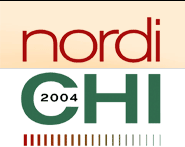|
|
W5 Aesthetic Approaches to Human-Computer Interaction
Various aesthetic approaches are getting increasing attention in the field of HCI. This development seems to have several independent drivers. Firstly, the never-ending paradigmatic crisis of the field leads HCI researchers to explore new theoretical foundations beyond information processing. Secondly, the relevant fields of inquiry for HCI is expanding beyond work arrangements to include a broader range of cultural settings and art forms - a cultural interface can be identified. Thirdly, a whole new set of interface problems, that cannot easily be solved within the current paradigms, evolve as everyday appliances, from kitchen equipment, over TV-sets, to clothes, imbed computers that we have to interact with directly or indirectly. HCI today is about art, entertainment, education, process control, coordination, and much more. Successful IT-support in most of these domains seems to rely on an understanding of use in aesthetic terms in order to account for experience dimensions of interaction. We have already seen a substantial corpus of contributions to HCI journals and conferences that address these new dimensions in aesthetic terms.
Purpose and themes
The purpose of this workshop is to provide a forum for people exploring and working with aesthetic approaches to HCI, addressing questions and issues like the following:
- What is the rationale, purpose, or utility of an aesthetic approach?
- Which concepts of, or from, aesthetics can a new approach to HCI be based on?
- What does aesthetics contribute to HCI?
- Theoretically
- Research methodically
- Practically (e.g. with respect to design methods)
- What kind of domains, will benefit particularly from an aesthetic approach? From software art to safety critical systems. Specific examples of systems or projects particularly informed by or informing aesthetics are invited.
Web page:
http://www.daimi.au.dk/~olavb/hciaest2004
|



